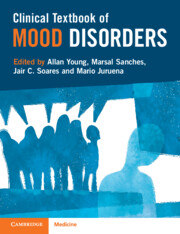Book contents
- Clinical Textbook of Mood Disorders
- Clinical Textbook of Mood Disorders
- Copyright page
- Contents
- Contributors
- Foreword
- Chapter 1 Mood Disorders in the Twenty-First Century
- Chapter 2 The Classification of Mood Disorders and the Unipolar/Bipolar Dichotomy
- Chapter 3 Epidemiology of Mood Disorders across the Life Span
- Chapter 4 The Mood Spectrum Concept: Clinical Implications
- Chapter 5 Clinical Screening for Unipolar and Bipolar Disorders
- Chapter 6 The Socioeconomic Costs of Mood Disorders
- Chapter 7 Mood Disorders and Suicide
- Chapter 8 Mood and Psychosis: Limits and Overlapping between Psychotic Disorders and Mood Disorders
- Chapter 9 Transcultural Issues in Mood Disorders
- Chapter 10 Mood Disorders and Stress-Related Disorders
- Chapter 11 The Common Ancestors of Anxiety and Depression: Comorbidity as a Cognitive, Behavioural, Neural and Cellular Phenotype, and Current Evidence for Photobiomodulation as a Novel Treatment
- Chapter 12 Mood Disorders and Comorbid Substance Use Disorders
- Chapter 13 Mood Disorders with Attention-Deficit/Hyperactivity Disorder, Impulse Control Disorders, or Borderline Personality Disorder
- Chapter 14 Phenomenological Psychopathology of Mood Disorders
- Chapter 15 Brain Imaging in Mood Disorders: Pathophysiological Significance and Clinical Perspectives
- Chapter 16 Inflammation and Metabolic Issues in Mood Disorders
- Chapter 17 Genetics of Mood Disorders
- Chapter 18 Management of Major Depressive Disorder: Basic Principles
- Chapter 19 Treatment-Resistant Depression: Pharmacological Approach
- Chapter 20 An Update on the Treatment of Manic and Hypomanic States
- Chapter 21 The Burden of Bipolar Depression
- Chapter 22 The Management of Neurocognitive Impairment in Mood Disorders
- Chapter 23 Progress in Biomarkers to Improve Treatment Outcomes in Major Depressive Disorder
- Chapter 24 Pharmacogenomics and the Management of Mood Disorders
- Chapter 25 Mood Disorders: Therapeutic Challenges in the Medically Ill Patient
- Chapter 26 The Treatment of Mood Disorders in Children and Adolescents
- Chapter 27 Considerations about the Treatment of Mood Disorders in Elderly Patients
- Chapter 28 Evidence-Based Psychological Interventions for Bipolar Disorders
- Chapter 29 Evidence-Based Psychotherapeutic Approaches for Depressive Disorders
- Chapter 30 Rating Instruments for Mood Disorders in Clinical Practice
- Chapter 31 Service Delivery for Mood Disorders
- Index
- References
Chapter 29 - Evidence-Based Psychotherapeutic Approaches for Depressive Disorders
Published online by Cambridge University Press: 16 May 2024
- Clinical Textbook of Mood Disorders
- Clinical Textbook of Mood Disorders
- Copyright page
- Contents
- Contributors
- Foreword
- Chapter 1 Mood Disorders in the Twenty-First Century
- Chapter 2 The Classification of Mood Disorders and the Unipolar/Bipolar Dichotomy
- Chapter 3 Epidemiology of Mood Disorders across the Life Span
- Chapter 4 The Mood Spectrum Concept: Clinical Implications
- Chapter 5 Clinical Screening for Unipolar and Bipolar Disorders
- Chapter 6 The Socioeconomic Costs of Mood Disorders
- Chapter 7 Mood Disorders and Suicide
- Chapter 8 Mood and Psychosis: Limits and Overlapping between Psychotic Disorders and Mood Disorders
- Chapter 9 Transcultural Issues in Mood Disorders
- Chapter 10 Mood Disorders and Stress-Related Disorders
- Chapter 11 The Common Ancestors of Anxiety and Depression: Comorbidity as a Cognitive, Behavioural, Neural and Cellular Phenotype, and Current Evidence for Photobiomodulation as a Novel Treatment
- Chapter 12 Mood Disorders and Comorbid Substance Use Disorders
- Chapter 13 Mood Disorders with Attention-Deficit/Hyperactivity Disorder, Impulse Control Disorders, or Borderline Personality Disorder
- Chapter 14 Phenomenological Psychopathology of Mood Disorders
- Chapter 15 Brain Imaging in Mood Disorders: Pathophysiological Significance and Clinical Perspectives
- Chapter 16 Inflammation and Metabolic Issues in Mood Disorders
- Chapter 17 Genetics of Mood Disorders
- Chapter 18 Management of Major Depressive Disorder: Basic Principles
- Chapter 19 Treatment-Resistant Depression: Pharmacological Approach
- Chapter 20 An Update on the Treatment of Manic and Hypomanic States
- Chapter 21 The Burden of Bipolar Depression
- Chapter 22 The Management of Neurocognitive Impairment in Mood Disorders
- Chapter 23 Progress in Biomarkers to Improve Treatment Outcomes in Major Depressive Disorder
- Chapter 24 Pharmacogenomics and the Management of Mood Disorders
- Chapter 25 Mood Disorders: Therapeutic Challenges in the Medically Ill Patient
- Chapter 26 The Treatment of Mood Disorders in Children and Adolescents
- Chapter 27 Considerations about the Treatment of Mood Disorders in Elderly Patients
- Chapter 28 Evidence-Based Psychological Interventions for Bipolar Disorders
- Chapter 29 Evidence-Based Psychotherapeutic Approaches for Depressive Disorders
- Chapter 30 Rating Instruments for Mood Disorders in Clinical Practice
- Chapter 31 Service Delivery for Mood Disorders
- Index
- References
Summary
This chapter describes evidence-based psychotherapeutic approaches for adults with depressive disorders. We focus on the most recognized, contemporary evidence-based psychotherapies for depression including: traditional and newer forms of cognitive behavioral therapy (defined broadly), interpersonal psychotherapy, brief dynamic psychotherapy and supportive psychotherapy. We summarize the findings on the extent to which these psychotherapies promote response, remission, relapse prevention, and recovery in adults and that permit these psychotherapies to be termed “evidence based.” Effect sizes are reported, allowing the reader to grasp quickly the efficacy of each psychotherapy used as a solitary treatment. We highlight current trends and future possibilities that may expand understanding of depressive disorders and increase access to effective psychotherapy for adults with depressive disorders.
Keywords
- Type
- Chapter
- Information
- Clinical Textbook of Mood Disorders , pp. 304 - 312Publisher: Cambridge University PressPrint publication year: 2024

